No products in the cart.
Buy Quality Assured products
Worldwide Delivery
Get Customized Washers in bulk quantity
Buy Quality Assured products
Worldwide Delivery
Get Customized Washers in bulk quantity
Menu
Categories
*Images shown for graphic representation. Not to scale.
Tooth Lock Washers – Complete Guide for Industrial & Commercial Use
Introduction
In the world of engineering, construction, and industrial manufacturing, fastening systems are the unsung heroes that hold machines and structures together. From tiny electronic devices to massive aerospace equipment, every assembly relies on nuts, bolts, and washers to provide strength, security, and stability. Among these, tooth lock washers play a crucial role in ensuring that fasteners remain tightly secured even under extreme conditions such as high vibration, rotational forces, and thermal expansion.
So, what exactly makes tooth lock washers so unique? Unlike plain washers, which simply distribute the load of a fastener, or spring washers, which use elasticity to resist loosening, tooth lock washers use a mechanical biting action. Their defining feature is the serrated “teeth” on either the inner or outer circumference. These teeth bite into the surface of the assembly and the fastener head, creating a locking effect that resists any tendency of the fastener to rotate loose.
This simple yet highly effective design has made tooth lock washers indispensable across industries:
In the automotive industry, they are used to secure critical engine and suspension components.
In the aerospace sector, they safeguard against bolt loosening caused by constant vibration during flight.
In electrical systems, they prevent loosening in switchboards, connectors, and transformers where safety is paramount.
In heavy machinery and construction, they ensure that fasteners remain stable even under massive loads.
Another reason why tooth lock washers are widely preferred is their versatility. They are manufactured in a variety of sizes (ranging from M3 to M50 and beyond), materials (such as stainless steel, mild steel, and zinc-plated steel), and designs (internal and external). This adaptability allows engineers and technicians to choose the perfect washer for the specific application, whether it involves resisting corrosion in marine environments or handling high torque in industrial machines.
In this guide, we will take a detailed journey into the world of tooth lock washers. From understanding their types and materials to analyzing their benefits, size charts, pricing, applications, and trusted suppliers, this resource will help buyers, engineers, and industry professionals make the best decision when sourcing washers for their needs.
By the end of this guide, you’ll have a clear understanding of:
How tooth lock washers work.
Their advantages over other types of washers.
Factors affecting tooth lock washer price.
Reference to the tooth lock washer size chart.
Where to find tooth lock washers manufacturers near me.
How to connect with internal tooth lock washers suppliers in India.
The answers to the most frequently asked questions about these washers.
In short, if you are looking for a complete reference guide to tooth lock washers, you are in the right place.
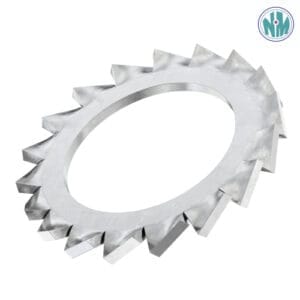

What Are Tooth Lock Washers?
To understand the importance of tooth lock washers, we first need to know what they are and how they differ from other types of washers. In simple terms, a washer is a thin plate (usually disk-shaped) with a hole in the middle, designed to distribute the load of a threaded fastener such as a screw or bolt. While plain washers only provide load distribution, tooth lock washers are designed with an additional function – to lock the fastener in place.
Defining Tooth Lock Washers
Tooth lock washers are special types of lock washers equipped with serrated teeth along their inner or outer circumference. These teeth dig into the fastener head and the surface of the material it is securing, creating a strong resistance against loosening caused by torque, vibration, or movement.
Their unique design ensures that even in applications where machines operate continuously under stress, the fastener remains intact, preventing accidents, breakdowns, and costly repairs.
Think of them as a safety guard for fasteners: while bolts and nuts hold things together, tooth lock washers make sure they stay together.
Types of Tooth Lock Washers
There are two primary types, each suited for different applications:
Internal Tooth Lock Washers
Teeth are positioned around the inner circumference of the washer.
They provide excellent locking around the shaft of the bolt or screw.
Commonly used in smaller assemblies like electrical equipment, appliances, and delicate machinery where external space is limited.
Preferred when appearance is important since the teeth remain hidden under the fastener head.
External Tooth Lock Washers
Teeth are located around the outer circumference.
They provide greater locking action and distribute pressure over a wider area.
Suitable for larger fasteners, heavy-duty assemblies, and applications where vibration is high.
Commonly used in automotive engines, aerospace equipment, and heavy construction machinery.
In some cases, combination tooth lock washers may also be available, featuring teeth on both the inner and outer diameters for maximum grip.
How Tooth Lock Washers Work
The working principle of tooth lock washers lies in friction and mechanical grip:
When a fastener is tightened, the teeth of the washer dig into both the fastener head and the substrate surface.
This prevents rotation, creating a secure “locking” action.
The pressure of the teeth increases with torque, meaning the more you tighten, the stronger the locking effect becomes.
Unlike adhesives or chemical thread lockers, this mechanical solution is simple, reusable in some cases, and does not require additional curing time.
Advantages Over Other Locking Methods
Compared to other locking solutions, tooth lock washers provide several benefits:
Compact design – no additional space is required.
Cost-effective – cheaper than advanced locking systems.
Reliable – proven to work in high-vibration environments.
Easy to install – requires no special tools or processes.
Versatile – works with a wide range of bolt and screw sizes.
Where Tooth Lock Washers Fit in the Fastener Family
To put it in context:
Plain washers → distribute load.
Spring washers → resist loosening with elasticity.
Tooth lock washers → resist loosening with serrated teeth grip.
This makes tooth lock washers the ideal choice for industries where safety and reliability are non-negotiable.
Importance of Tooth Lock Washers in Industrial Applications
In industrial environments, every small component plays a huge role in ensuring safety, reliability, and efficiency. While nuts and bolts may seem like the stars of fastening systems, the humble washer often determines whether a connection holds strong or fails under stress. Among the different washer types, tooth lock washers have earned their reputation as one of the most reliable solutions for preventing loosening in heavy-duty applications.
Their importance lies in their ability to resist vibration, distribute load evenly, and maintain long-term stability—qualities that are critical in sectors where a loose fastener can cause breakdowns, financial losses, or even life-threatening accidents.
Why Tooth Lock Washers Are Vital in Industry
Prevention of Fastener Loosening
In machines that operate continuously, vibration is inevitable. Without the right locking mechanism, bolts can gradually work themselves loose. Tooth lock washers solve this problem by biting into both the fastener and the assembly surface, ensuring a tight grip that resists loosening.Safety Assurance
A single loose fastener in equipment like an aircraft engine or a heavy crane can lead to catastrophic failures. Tooth lock washers add a layer of security that prevents accidents caused by mechanical faults.Durability in Extreme Conditions
Industrial environments expose fasteners to heat, pressure, moisture, and chemical contact. Made from stainless steel, mild steel, or zinc-coated materials, tooth lock washers maintain performance even under such harsh conditions.Cost-Effective Maintenance
Equipment failures often result in expensive downtime. By ensuring fasteners stay tight, tooth lock washers minimize the need for frequent maintenance checks, saving both time and costs.
Industry-Specific Applications of Tooth Lock Washers
Automotive Industry
Vehicles generate high levels of vibration, especially in engines, gearboxes, and suspension systems. Here, tooth lock washers are critical in keeping fasteners secure, preventing breakdowns, and ensuring passenger safety.Aerospace and Defense
Aircraft and defense equipment cannot afford the risk of fastener loosening. In these sectors, external tooth lock washers are commonly used to provide maximum grip under vibration and extreme atmospheric conditions.Electrical and Electronics
For electrical assemblies, particularly in switchboards, circuit boards, and connectors, internal tooth lock washers are preferred. They provide excellent locking ability in compact spaces without damaging delicate surfaces.Heavy Machinery and Equipment
Industrial machines such as turbines, compressors, and presses operate under high loads and shocks. Tooth lock washers ensure the stability of their fasteners, preventing sudden failures during operations.Construction Industry
From steel structures to bridges and heavy frameworks, construction projects demand secure fastening solutions. Tooth lock washers distribute load effectively while ensuring bolts remain intact over years of use.Marine Industry
Corrosion is a major concern in marine applications. Stainless steel tooth lock washers are used in shipbuilding and offshore platforms to prevent loosening while withstanding saltwater exposure.
The Role of Tooth Lock Washers in Quality Assurance
For manufacturers, engineers, and assembly line managers, using tooth lock washers is not just about preventing loosening—it’s about ensuring compliance with safety standards. Many industries, including aerospace and automotive, follow strict ISO and ASTM guidelines for fasteners. Incorporating high-quality tooth lock washers helps businesses meet these standards and maintain product reliability.
Case Example – Why Tooth Lock Washers Are a Game-Changer
Imagine a large industrial generator running 24/7 in a power plant. Without proper locking washers, the constant vibration could slowly loosen bolts, leading to misalignment, breakdown, or even fire hazards. By simply incorporating tooth lock washers, the plant ensures that bolts remain tight, reducing downtime, increasing safety, and saving millions in potential losses.
Summary of Importance
They prevent fastener failures caused by vibration.
They enhance operational safety in high-stakes industries.
They reduce downtime and maintenance costs.
They extend the life of assemblies and machinery.
They help companies comply with industrial safety and quality standards.
In short, the use of tooth lock washers is not optional—it is a necessity for any industry that prioritizes safety, durability, and performance.
Materials Used in Tooth Lock Washers
One of the main reasons why tooth lock washers are so versatile and reliable is the wide range of materials they are manufactured in. The choice of material directly affects their strength, durability, resistance to corrosion, cost, and suitability for specific environments. Selecting the correct material ensures that the washer performs effectively throughout the life of the assembly.
Let’s explore the most common materials used for tooth lock washers, their advantages, limitations, and typical applications.
1. Stainless Steel Tooth Lock Washers
Features:
Manufactured in grades such as SS202, SS304, and SS316.
Offer high resistance to corrosion and rust.
Maintain mechanical strength under high temperatures and extreme conditions.
Advantages:
Long-lasting performance even in marine or outdoor environments.
Ideal for industries like aerospace, construction, and chemical plants.
Available in multiple sizes, from M3 to large heavy-duty washers.
Limitations:
Higher cost compared to mild steel or zinc-coated options.
Not always necessary for low-risk indoor applications.
Best Applications:
Marine Industry – For shipbuilding and offshore structures.
Food Processing Plants – Where hygiene and corrosion resistance are critical.
Automotive & Aerospace – High safety and durability requirements.
2. Mild Steel (MS) Tooth Lock Washers
Features:
Made from carbon steel with relatively low tensile strength.
Cost-effective and widely available.
Advantages:
Affordable compared to stainless steel.
Suitable for general-purpose fastening where corrosion is not a concern.
Easy to machine and mass-produce, making it a common choice for bulk buyers.
Limitations:
Prone to rusting in humid or corrosive environments.
Limited lifespan in high-stress or outdoor conditions unless coated.
Best Applications:
Indoor machinery where moisture exposure is minimal.
Construction projects in controlled environments.
Furniture and light engineering applications.
3. Zinc-Plated Tooth Lock Washers
Features:
Made of steel, coated with a layer of zinc plating.
Provides extra resistance to corrosion compared to plain mild steel.
Advantages:
Combines the strength of steel with rust protection.
More affordable than stainless steel.
Shiny finish makes it suitable for visible assemblies.
Limitations:
Zinc coating can wear off over time, reducing corrosion resistance.
Not suitable for extreme marine or chemical exposure.
Best Applications:
Electrical fittings and switchboards.
Automobiles – under-the-hood fasteners.
General industrial equipment where cost and moderate corrosion resistance matter.
4. Brass Tooth Lock Washers
Features:
Made from a copper-zinc alloy.
Known for excellent electrical conductivity and moderate corrosion resistance.
Advantages:
Non-magnetic, making it ideal for sensitive equipment.
Good resistance to tarnish and atmospheric corrosion.
Provides a clean, decorative appearance.
Limitations:
Not as strong as steel-based washers.
More expensive than mild steel.
Best Applications:
Electrical and electronics industry.
Decorative fittings where appearance matters.
Precision instruments requiring non-magnetic properties.
5. Phosphor Bronze Tooth Lock Washers
Features:
Alloy of copper, tin, and phosphorus.
Offers a balance of strength, wear resistance, and corrosion resistance.
Advantages:
Excellent electrical conductivity.
Superior resistance to fatigue and wear.
Performs well in marine and chemical environments.
Limitations:
More expensive than brass and mild steel.
Limited availability compared to steel washers.
Best Applications:
Switchgear and electrical connectors.
Aerospace components requiring both strength and conductivity.
Marine engineering due to resistance to saltwater corrosion.
Comparison Table of Materials
| Material | Corrosion Resistance | Strength | Cost | Best Use Case |
|---|---|---|---|---|
| Stainless Steel | Excellent | High | High | Marine, aerospace, chemical plants |
| Mild Steel | Poor | Medium | Low | Indoor machinery, general purpose |
| Zinc-Plated Steel | Moderate | Medium | Medium | Automotive, electrical, industrial |
| Brass | Moderate | Low-Med | Medium-High | Electrical fittings, decorative use |
| Phosphor Bronze | High | High | High | Aerospace, marine, electrical |
Why Material Choice Matters
Choosing the right material for tooth lock washers is not just about cost—it’s about matching performance with application needs. For instance:
Using mild steel washers in a marine application will lead to rust and failure.
Using stainless steel in a simple indoor assembly might increase costs unnecessarily.
Electrical applications demand brass or phosphor bronze for conductivity.
Therefore, buyers must balance budget, environment, strength requirements, and safety factors when selecting the right washer material.
Types of Tooth Lock Washers
Tooth lock washers are not just one standard product; they come in multiple designs to suit different mechanical and industrial needs. Each type has its own unique configuration of teeth that provide a locking effect. Let’s look at the most commonly used types of tooth lock washers:
1. Internal Tooth Lock Washers
These washers have teeth pointing inward toward the center hole.
They are commonly used under the head of screws or bolts to provide excellent locking against rotation.
Best suited where the washer needs to grip a smooth surface without protruding outward.
Frequently seen in electronics, automotive parts, and precision instruments.
2. External Tooth Lock Washers
These washers have teeth on the outer edge, pointing outward.
They provide greater locking force because of the larger circumference and more aggressive grip.
Often used in assemblies that require maximum torque resistance, such as heavy machinery and structural connections.
3. Combination Tooth Lock Washers (Internal-External)
These unique washers have both internal and external teeth, giving them double locking capability.
Ideal when the washer must grip both the fastener head and the surface beneath.
Commonly used in aerospace, defense, and industrial machinery where vibration resistance is critical.
4. Countersunk Tooth Lock Washers
Designed with teeth that fit into countersunk screw heads.
Provide a flush finish, which is important in applications where space is tight or aesthetics matter.
Widely used in electronics, aerospace, and light engineering industries.
5. Stainless Steel Tooth Lock Washers
Manufactured from corrosion-resistant stainless steel.
Perfect for use in marine, outdoor, and chemical industries where exposure to moisture and harsh environments is common.
Long-lasting and durable, making them cost-effective despite a higher initial tooth lock washer price.
Manufacturing and Materials of Tooth Lock Washers
The performance of a tooth lock washer largely depends on its manufacturing process and the material used. A well-manufactured washer not only provides excellent locking ability but also ensures durability under different working conditions such as vibration, temperature changes, and corrosive environments. Below is a complete overview of how tooth lock washers are produced and the common materials used.
1. Manufacturing Process of Tooth Lock Washers
a) Material Selection
The first step is choosing the base material – typically carbon steel, stainless steel, or phosphor bronze.
The choice depends on the intended application. For instance, stainless steel is ideal for marine use, while carbon steel works well in heavy machinery.
b) Blanking
Large sheets of the selected metal are cut into smaller blanks (round flat pieces).
Precision machines ensure that the inner and outer diameters meet exact tooth lock washer size chart specifications.
c) Tooth Formation
Specialized stamping tools cut or bend teeth around the washer’s inner or outer circumference.
This is the most critical step, as the teeth must be sharp and uniform to provide a firm grip.
d) Heat Treatment
The washers undergo controlled heating and cooling to improve hardness and strength.
Heat-treated washers last longer, resist wear, and perform better under high torque.
e) Surface Finishing
Finishing processes such as zinc plating, black oxide coating, or galvanization are applied to prevent corrosion.
For industries like aerospace or defense, high-grade coatings like cadmium plating may be used.
f) Quality Testing
Each batch undergoes rigorous testing for dimensions, hardness, tensile strength, and durability.
Modern manufacturers use digital measuring systems to ensure each washer meets international standards.
2. Materials Used in Tooth Lock Washers
a) Carbon Steel
Most widely used material for tooth lock washers.
Offers excellent strength and toughness.
Cost-effective, making it suitable for bulk use.
Common in automotive, railways, and heavy machinery industries.
b) Stainless Steel
Resistant to corrosion, rust, and high temperatures.
Widely used in marine, outdoor, and chemical industries.
Preferred when durability is more important than cost.
c) Phosphor Bronze
Known for excellent electrical conductivity and resistance to wear.
Commonly used in electrical and electronic assemblies.
Provides reliable performance in circuits and connectors.
d) Alloy Steel
Enhanced with elements like nickel, chromium, and molybdenum.
Provides superior strength and fatigue resistance.
Best for high-stress environments like aerospace and defense applications.
e) Brass
Offers good corrosion resistance and conductivity.
Ideal for decorative, light engineering, and electrical applications.
3. Why Material Matters for Buyers
Performance: The wrong material can fail under stress, leading to breakdowns.
Cost Efficiency: Buyers must balance cost vs. durability when choosing between carbon steel and stainless steel.
Industry Standards: Some industries (like aerospace or defense) require certified materials.
Lifespan: High-quality materials reduce replacement frequency, lowering long-term costs.
Applications and Industries Using Tooth Lock Washers
Tooth lock washers are not limited to one field – their locking ability against vibration and loosening makes them indispensable across multiple industries. Whether it’s small electronics or massive construction projects, these washers ensure safety, reliability, and long-term durability of fastened joints. Below are the major industries and their specific applications:
1. Automotive Industry
Applications:
Used in engines, gearboxes, suspension systems, and braking assemblies.
Helps prevent nuts and bolts from loosening due to high vibration.
Why Tooth Lock Washers?
Enhances vehicle safety.
Reduces the need for frequent maintenance.
Example: Internal tooth lock washers are used in dashboard assemblies, while external types are applied in engine compartments.
2. Aerospace and Aviation
Applications:
Airplane engines, fuselage assemblies, and turbine parts.
Prevent loosening under extreme vibration and pressure changes.
Why Tooth Lock Washers?
Critical for safety-sensitive components where failure is not an option.
Stainless steel and alloy tooth lock washers are preferred due to their durability.
Example: Combination internal-external washers are used in jet engines for maximum security.
3. Electronics and Electrical Equipment
Applications:
Circuit boards, electrical panels, connectors, and switches.
Internal tooth washers provide grip without protruding, making them ideal for compact designs.
Why Tooth Lock Washers?
Prevents small screws from loosening.
Phosphor bronze washers add conductivity and reduce the risk of sparking.
Example: Internal tooth washers are often used in computer motherboards and transformers.
4. Marine Industry
Applications:
Boats, docks, offshore equipment, and ship engines.
Must withstand corrosion, saltwater, and humidity.
Why Tooth Lock Washers?
Stainless steel tooth lock washers provide long-term rust resistance.
Maintains joint security even in harsh weather.
Example: Stainless steel external tooth washers are used in propeller shafts and hull fastenings.
5. Construction and Infrastructure
Applications:
Steel structures, pipelines, bridges, and heavy equipment.
External tooth washers are used where maximum grip is required.
Why Tooth Lock Washers?
Improves structural integrity by holding bolts tight.
Prevents loosening caused by wind, traffic, and vibrations.
Example: Used in railway tracks, highway bridges, and skyscraper frameworks.
6. Defense and Military Equipment
Applications:
Tanks, armored vehicles, submarines, and defense machinery.
Why Tooth Lock Washers?
Provides vibration resistance under battlefield conditions.
Alloy steel versions ensure durability under high stress and impact.
Example: Combination washers are commonly used in weapon systems and heavy artillery.
7. Renewable Energy Sector
Applications:
Wind turbines, solar panel mounts, and hydroelectric machinery.
Why Tooth Lock Washers?
Prevent loosening in vibration-heavy wind turbines.
Withstand outdoor environments for years without replacement.
Example: Stainless steel tooth lock washers secure bolts in solar panel mounting structures.
8. Railways
Applications:
Engine parts, carriage assemblies, and railway track bolts.
Why Tooth Lock Washers?
Prevents loosening caused by continuous vibrations and dynamic loads.
Reduces risk of accidents due to fastener failure.
Example: External tooth washers are widely used in railway bridges and bogies.
9. Household and Consumer Goods
Applications:
Appliances, furniture, and gardening tools.
Why Tooth Lock Washers?
Keeps screws tight in small devices.
Increases product longevity by reducing fastener loosening.
Example: Internal tooth washers are commonly found in washing machines, fans, and kitchen appliances.
Frequently Asked Questions (FAQs)
Q1: What are tooth lock washer used for?
A: They are used to prevent nuts and bolts from loosening under vibration and load.
Q2: What is the difference between internal and external tooth lock washer?
A: Internal types grip around the bolt shaft, while external types grip the larger surface area.
Q3: Are stainless steel tooth lock washer better than mild steel ones?
A: Yes, stainless steel offers superior corrosion resistance and durability.
Q4: How do I read a tooth lock washer size chart?
A: Match the internal diameter to the bolt size, then check the external diameter and thickness.
Q5: Can I buy tooth lock washer in bulk?
A: Yes, manufacturers and suppliers often provide discounts for bulk orders.
Q6: What factors affect tooth lock washer price?
A: Material, size, surface finish, and quantity.
Q7: Where can I find tooth lock washer manufacturers near me?
A: You can search online directories, industrial marketplaces, or local suppliers.
Q8: Are tooth lock washers reusable?
A: Generally, they are single-use for maximum locking efficiency.
Q9: Do tooth lock washers work with plastic surfaces?
A: They are more effective with metals, but certain applications may allow use with plastics.
Q10: What industries commonly use tooth lock washers?
A: Automotive, aerospace, defense, electrical, construction, and machinery.
Q11: What is the advantage of zinc-plated tooth lock washer?
A: They provide added rust resistance at a lower cost compared to stainless steel.
Q12: Do internal tooth lock washer suppliers in India export globally?
A: Yes, many Indian suppliers export worldwide due to demand.
Q13: Can tooth lock washer replace spring washers?
A: Yes, in many applications they are more effective against vibration.
Q14: How do I ensure I’m buying quality washers?
A: Always purchase from reputed suppliers and check ISO or ASTM standards.
Q15: Are customized sizes of tooth lock washer available?
A: Yes, manufacturers can provide custom sizes upon request.
Why Choose Nafees Metal Industries
At Nafees Metal industries, we are dedicated to producing high-quality, precision-engineered Tooth Lock Washers that meet the unique needs of our customers. With a focus on durability, reliability, and customer satisfaction, we offer customizable options to suit your specific application, along with competitive pricing, fast delivery, and outstanding customer support. Choose us for all your fastening needs and experience the superior performance of our Tooth Lock Washers.
Visit our manufacturing unit at Reay Road, Mumbai .

Be the first to review “Tooth Lock Washers” Cancel reply
Tooth Lock Washers
13 people are viewing this product right now
₹1.20 /per piece
Tooth Lock Washers
We have this product in all sizes & all metals as per your requirements.
To share your requirements contact us by using the Call us?or Request Quote?option below.
Pricing will be based on the customization.
Estimated delivery:14 days
Tooth Lock Washers – Complete Guide for Industrial & Commercial Use
Introduction
In the world of engineering, construction, and industrial manufacturing, fastening systems are the unsung heroes that hold machines and structures together. From tiny electronic devices to massive aerospace equipment, every assembly relies on nuts, bolts, and washers to provide strength, security, and stability. Among these, tooth lock washers play a crucial role in ensuring that fasteners remain tightly secured even under extreme conditions such as high vibration, rotational forces, and thermal expansion.
So, what exactly makes tooth lock washers so unique? Unlike plain washers, which simply distribute the load of a fastener, or spring washers, which use elasticity to resist loosening, tooth lock washers use a mechanical biting action. Their defining feature is the serrated “teeth” on either the inner or outer circumference. These teeth bite into the surface of the assembly and the fastener head, creating a locking effect that resists any tendency of the fastener to rotate loose.
This simple yet highly effective design has made tooth lock washers indispensable across industries:
In the automotive industry, they are used to secure critical engine and suspension components.
In the aerospace sector, they safeguard against bolt loosening caused by constant vibration during flight.
In electrical systems, they prevent loosening in switchboards, connectors, and transformers where safety is paramount.
In heavy machinery and construction, they ensure that fasteners remain stable even under massive loads.
Another reason why tooth lock washers are widely preferred is their versatility. They are manufactured in a variety of sizes (ranging from M3 to M50 and beyond), materials (such as stainless steel, mild steel, and zinc-plated steel), and designs (internal and external). This adaptability allows engineers and technicians to choose the perfect washer for the specific application, whether it involves resisting corrosion in marine environments or handling high torque in industrial machines.
In this guide, we will take a detailed journey into the world of tooth lock washers. From understanding their types and materials to analyzing their benefits, size charts, pricing, applications, and trusted suppliers, this resource will help buyers, engineers, and industry professionals make the best decision when sourcing washers for their needs.
By the end of this guide, you’ll have a clear understanding of:
How tooth lock washers work.
Their advantages over other types of washers.
Factors affecting tooth lock washer price.
Reference to the tooth lock washer size chart.
Where to find tooth lock washers manufacturers near me.
How to connect with internal tooth lock washers suppliers in India.
The answers to the most frequently asked questions about these washers.
In short, if you are looking for a complete reference guide to tooth lock washers, you are in the right place.


What Are Tooth Lock Washers?
To understand the importance of tooth lock washers, we first need to know what they are and how they differ from other types of washers. In simple terms, a washer is a thin plate (usually disk-shaped) with a hole in the middle, designed to distribute the load of a threaded fastener such as a screw or bolt. While plain washers only provide load distribution, tooth lock washers are designed with an additional function – to lock the fastener in place.
Defining Tooth Lock Washers
Tooth lock washers are special types of lock washers equipped with serrated teeth along their inner or outer circumference. These teeth dig into the fastener head and the surface of the material it is securing, creating a strong resistance against loosening caused by torque, vibration, or movement.
Their unique design ensures that even in applications where machines operate continuously under stress, the fastener remains intact, preventing accidents, breakdowns, and costly repairs.
Think of them as a safety guard for fasteners: while bolts and nuts hold things together, tooth lock washers make sure they stay together.
Types of Tooth Lock Washers
There are two primary types, each suited for different applications:
Internal Tooth Lock Washers
Teeth are positioned around the inner circumference of the washer.
They provide excellent locking around the shaft of the bolt or screw.
Commonly used in smaller assemblies like electrical equipment, appliances, and delicate machinery where external space is limited.
Preferred when appearance is important since the teeth remain hidden under the fastener head.
External Tooth Lock Washers
Teeth are located around the outer circumference.
They provide greater locking action and distribute pressure over a wider area.
Suitable for larger fasteners, heavy-duty assemblies, and applications where vibration is high.
Commonly used in automotive engines, aerospace equipment, and heavy construction machinery.
In some cases, combination tooth lock washers may also be available, featuring teeth on both the inner and outer diameters for maximum grip.
How Tooth Lock Washers Work
The working principle of tooth lock washers lies in friction and mechanical grip:
When a fastener is tightened, the teeth of the washer dig into both the fastener head and the substrate surface.
This prevents rotation, creating a secure “locking” action.
The pressure of the teeth increases with torque, meaning the more you tighten, the stronger the locking effect becomes.
Unlike adhesives or chemical thread lockers, this mechanical solution is simple, reusable in some cases, and does not require additional curing time.
Advantages Over Other Locking Methods
Compared to other locking solutions, tooth lock washers provide several benefits:
Compact design – no additional space is required.
Cost-effective – cheaper than advanced locking systems.
Reliable – proven to work in high-vibration environments.
Easy to install – requires no special tools or processes.
Versatile – works with a wide range of bolt and screw sizes.
Where Tooth Lock Washers Fit in the Fastener Family
To put it in context:
Plain washers → distribute load.
Spring washers → resist loosening with elasticity.
Tooth lock washers → resist loosening with serrated teeth grip.
This makes tooth lock washers the ideal choice for industries where safety and reliability are non-negotiable.
Importance of Tooth Lock Washers in Industrial Applications
In industrial environments, every small component plays a huge role in ensuring safety, reliability, and efficiency. While nuts and bolts may seem like the stars of fastening systems, the humble washer often determines whether a connection holds strong or fails under stress. Among the different washer types, tooth lock washers have earned their reputation as one of the most reliable solutions for preventing loosening in heavy-duty applications.
Their importance lies in their ability to resist vibration, distribute load evenly, and maintain long-term stability—qualities that are critical in sectors where a loose fastener can cause breakdowns, financial losses, or even life-threatening accidents.
Why Tooth Lock Washers Are Vital in Industry
Prevention of Fastener Loosening
In machines that operate continuously, vibration is inevitable. Without the right locking mechanism, bolts can gradually work themselves loose. Tooth lock washers solve this problem by biting into both the fastener and the assembly surface, ensuring a tight grip that resists loosening.Safety Assurance
A single loose fastener in equipment like an aircraft engine or a heavy crane can lead to catastrophic failures. Tooth lock washers add a layer of security that prevents accidents caused by mechanical faults.Durability in Extreme Conditions
Industrial environments expose fasteners to heat, pressure, moisture, and chemical contact. Made from stainless steel, mild steel, or zinc-coated materials, tooth lock washers maintain performance even under such harsh conditions.Cost-Effective Maintenance
Equipment failures often result in expensive downtime. By ensuring fasteners stay tight, tooth lock washers minimize the need for frequent maintenance checks, saving both time and costs.
Industry-Specific Applications of Tooth Lock Washers
Automotive Industry
Vehicles generate high levels of vibration, especially in engines, gearboxes, and suspension systems. Here, tooth lock washers are critical in keeping fasteners secure, preventing breakdowns, and ensuring passenger safety.Aerospace and Defense
Aircraft and defense equipment cannot afford the risk of fastener loosening. In these sectors, external tooth lock washers are commonly used to provide maximum grip under vibration and extreme atmospheric conditions.Electrical and Electronics
For electrical assemblies, particularly in switchboards, circuit boards, and connectors, internal tooth lock washers are preferred. They provide excellent locking ability in compact spaces without damaging delicate surfaces.Heavy Machinery and Equipment
Industrial machines such as turbines, compressors, and presses operate under high loads and shocks. Tooth lock washers ensure the stability of their fasteners, preventing sudden failures during operations.Construction Industry
From steel structures to bridges and heavy frameworks, construction projects demand secure fastening solutions. Tooth lock washers distribute load effectively while ensuring bolts remain intact over years of use.Marine Industry
Corrosion is a major concern in marine applications. Stainless steel tooth lock washers are used in shipbuilding and offshore platforms to prevent loosening while withstanding saltwater exposure.
The Role of Tooth Lock Washers in Quality Assurance
For manufacturers, engineers, and assembly line managers, using tooth lock washers is not just about preventing loosening—it’s about ensuring compliance with safety standards. Many industries, including aerospace and automotive, follow strict ISO and ASTM guidelines for fasteners. Incorporating high-quality tooth lock washers helps businesses meet these standards and maintain product reliability.
Case Example – Why Tooth Lock Washers Are a Game-Changer
Imagine a large industrial generator running 24/7 in a power plant. Without proper locking washers, the constant vibration could slowly loosen bolts, leading to misalignment, breakdown, or even fire hazards. By simply incorporating tooth lock washers, the plant ensures that bolts remain tight, reducing downtime, increasing safety, and saving millions in potential losses.
Summary of Importance
They prevent fastener failures caused by vibration.
They enhance operational safety in high-stakes industries.
They reduce downtime and maintenance costs.
They extend the life of assemblies and machinery.
They help companies comply with industrial safety and quality standards.
In short, the use of tooth lock washers is not optional—it is a necessity for any industry that prioritizes safety, durability, and performance.
Materials Used in Tooth Lock Washers
One of the main reasons why tooth lock washers are so versatile and reliable is the wide range of materials they are manufactured in. The choice of material directly affects their strength, durability, resistance to corrosion, cost, and suitability for specific environments. Selecting the correct material ensures that the washer performs effectively throughout the life of the assembly.
Let’s explore the most common materials used for tooth lock washers, their advantages, limitations, and typical applications.
1. Stainless Steel Tooth Lock Washers
Features:
Manufactured in grades such as SS202, SS304, and SS316.
Offer high resistance to corrosion and rust.
Maintain mechanical strength under high temperatures and extreme conditions.
Advantages:
Long-lasting performance even in marine or outdoor environments.
Ideal for industries like aerospace, construction, and chemical plants.
Available in multiple sizes, from M3 to large heavy-duty washers.
Limitations:
Higher cost compared to mild steel or zinc-coated options.
Not always necessary for low-risk indoor applications.
Best Applications:
Marine Industry – For shipbuilding and offshore structures.
Food Processing Plants – Where hygiene and corrosion resistance are critical.
Automotive & Aerospace – High safety and durability requirements.
2. Mild Steel (MS) Tooth Lock Washers
Features:
Made from carbon steel with relatively low tensile strength.
Cost-effective and widely available.
Advantages:
Affordable compared to stainless steel.
Suitable for general-purpose fastening where corrosion is not a concern.
Easy to machine and mass-produce, making it a common choice for bulk buyers.
Limitations:
Prone to rusting in humid or corrosive environments.
Limited lifespan in high-stress or outdoor conditions unless coated.
Best Applications:
Indoor machinery where moisture exposure is minimal.
Construction projects in controlled environments.
Furniture and light engineering applications.
3. Zinc-Plated Tooth Lock Washers
Features:
Made of steel, coated with a layer of zinc plating.
Provides extra resistance to corrosion compared to plain mild steel.
Advantages:
Combines the strength of steel with rust protection.
More affordable than stainless steel.
Shiny finish makes it suitable for visible assemblies.
Limitations:
Zinc coating can wear off over time, reducing corrosion resistance.
Not suitable for extreme marine or chemical exposure.
Best Applications:
Electrical fittings and switchboards.
Automobiles – under-the-hood fasteners.
General industrial equipment where cost and moderate corrosion resistance matter.
4. Brass Tooth Lock Washers
Features:
Made from a copper-zinc alloy.
Known for excellent electrical conductivity and moderate corrosion resistance.
Advantages:
Non-magnetic, making it ideal for sensitive equipment.
Good resistance to tarnish and atmospheric corrosion.
Provides a clean, decorative appearance.
Limitations:
Not as strong as steel-based washers.
More expensive than mild steel.
Best Applications:
Electrical and electronics industry.
Decorative fittings where appearance matters.
Precision instruments requiring non-magnetic properties.
5. Phosphor Bronze Tooth Lock Washers
Features:
Alloy of copper, tin, and phosphorus.
Offers a balance of strength, wear resistance, and corrosion resistance.
Advantages:
Excellent electrical conductivity.
Superior resistance to fatigue and wear.
Performs well in marine and chemical environments.
Limitations:
More expensive than brass and mild steel.
Limited availability compared to steel washers.
Best Applications:
Switchgear and electrical connectors.
Aerospace components requiring both strength and conductivity.
Marine engineering due to resistance to saltwater corrosion.
Comparison Table of Materials
| Material | Corrosion Resistance | Strength | Cost | Best Use Case |
|---|---|---|---|---|
| Stainless Steel | Excellent | High | High | Marine, aerospace, chemical plants |
| Mild Steel | Poor | Medium | Low | Indoor machinery, general purpose |
| Zinc-Plated Steel | Moderate | Medium | Medium | Automotive, electrical, industrial |
| Brass | Moderate | Low-Med | Medium-High | Electrical fittings, decorative use |
| Phosphor Bronze | High | High | High | Aerospace, marine, electrical |
Why Material Choice Matters
Choosing the right material for tooth lock washers is not just about cost—it’s about matching performance with application needs. For instance:
Using mild steel washers in a marine application will lead to rust and failure.
Using stainless steel in a simple indoor assembly might increase costs unnecessarily.
Electrical applications demand brass or phosphor bronze for conductivity.
Therefore, buyers must balance budget, environment, strength requirements, and safety factors when selecting the right washer material.
Types of Tooth Lock Washers
Tooth lock washers are not just one standard product; they come in multiple designs to suit different mechanical and industrial needs. Each type has its own unique configuration of teeth that provide a locking effect. Let’s look at the most commonly used types of tooth lock washers:
1. Internal Tooth Lock Washers
These washers have teeth pointing inward toward the center hole.
They are commonly used under the head of screws or bolts to provide excellent locking against rotation.
Best suited where the washer needs to grip a smooth surface without protruding outward.
Frequently seen in electronics, automotive parts, and precision instruments.
2. External Tooth Lock Washers
These washers have teeth on the outer edge, pointing outward.
They provide greater locking force because of the larger circumference and more aggressive grip.
Often used in assemblies that require maximum torque resistance, such as heavy machinery and structural connections.
3. Combination Tooth Lock Washers (Internal-External)
These unique washers have both internal and external teeth, giving them double locking capability.
Ideal when the washer must grip both the fastener head and the surface beneath.
Commonly used in aerospace, defense, and industrial machinery where vibration resistance is critical.
4. Countersunk Tooth Lock Washers
Designed with teeth that fit into countersunk screw heads.
Provide a flush finish, which is important in applications where space is tight or aesthetics matter.
Widely used in electronics, aerospace, and light engineering industries.
5. Stainless Steel Tooth Lock Washers
Manufactured from corrosion-resistant stainless steel.
Perfect for use in marine, outdoor, and chemical industries where exposure to moisture and harsh environments is common.
Long-lasting and durable, making them cost-effective despite a higher initial tooth lock washer price.
Manufacturing and Materials of Tooth Lock Washers
The performance of a tooth lock washer largely depends on its manufacturing process and the material used. A well-manufactured washer not only provides excellent locking ability but also ensures durability under different working conditions such as vibration, temperature changes, and corrosive environments. Below is a complete overview of how tooth lock washers are produced and the common materials used.
1. Manufacturing Process of Tooth Lock Washers
a) Material Selection
The first step is choosing the base material – typically carbon steel, stainless steel, or phosphor bronze.
The choice depends on the intended application. For instance, stainless steel is ideal for marine use, while carbon steel works well in heavy machinery.
b) Blanking
Large sheets of the selected metal are cut into smaller blanks (round flat pieces).
Precision machines ensure that the inner and outer diameters meet exact tooth lock washer size chart specifications.
c) Tooth Formation
Specialized stamping tools cut or bend teeth around the washer’s inner or outer circumference.
This is the most critical step, as the teeth must be sharp and uniform to provide a firm grip.
d) Heat Treatment
The washers undergo controlled heating and cooling to improve hardness and strength.
Heat-treated washers last longer, resist wear, and perform better under high torque.
e) Surface Finishing
Finishing processes such as zinc plating, black oxide coating, or galvanization are applied to prevent corrosion.
For industries like aerospace or defense, high-grade coatings like cadmium plating may be used.
f) Quality Testing
Each batch undergoes rigorous testing for dimensions, hardness, tensile strength, and durability.
Modern manufacturers use digital measuring systems to ensure each washer meets international standards.
2. Materials Used in Tooth Lock Washers
a) Carbon Steel
Most widely used material for tooth lock washers.
Offers excellent strength and toughness.
Cost-effective, making it suitable for bulk use.
Common in automotive, railways, and heavy machinery industries.
b) Stainless Steel
Resistant to corrosion, rust, and high temperatures.
Widely used in marine, outdoor, and chemical industries.
Preferred when durability is more important than cost.
c) Phosphor Bronze
Known for excellent electrical conductivity and resistance to wear.
Commonly used in electrical and electronic assemblies.
Provides reliable performance in circuits and connectors.
d) Alloy Steel
Enhanced with elements like nickel, chromium, and molybdenum.
Provides superior strength and fatigue resistance.
Best for high-stress environments like aerospace and defense applications.
e) Brass
Offers good corrosion resistance and conductivity.
Ideal for decorative, light engineering, and electrical applications.
3. Why Material Matters for Buyers
Performance: The wrong material can fail under stress, leading to breakdowns.
Cost Efficiency: Buyers must balance cost vs. durability when choosing between carbon steel and stainless steel.
Industry Standards: Some industries (like aerospace or defense) require certified materials.
Lifespan: High-quality materials reduce replacement frequency, lowering long-term costs.
Applications and Industries Using Tooth Lock Washers
Tooth lock washers are not limited to one field – their locking ability against vibration and loosening makes them indispensable across multiple industries. Whether it’s small electronics or massive construction projects, these washers ensure safety, reliability, and long-term durability of fastened joints. Below are the major industries and their specific applications:
1. Automotive Industry
Applications:
Used in engines, gearboxes, suspension systems, and braking assemblies.
Helps prevent nuts and bolts from loosening due to high vibration.
Why Tooth Lock Washers?
Enhances vehicle safety.
Reduces the need for frequent maintenance.
Example: Internal tooth lock washers are used in dashboard assemblies, while external types are applied in engine compartments.
2. Aerospace and Aviation
Applications:
Airplane engines, fuselage assemblies, and turbine parts.
Prevent loosening under extreme vibration and pressure changes.
Why Tooth Lock Washers?
Critical for safety-sensitive components where failure is not an option.
Stainless steel and alloy tooth lock washers are preferred due to their durability.
Example: Combination internal-external washers are used in jet engines for maximum security.
3. Electronics and Electrical Equipment
Applications:
Circuit boards, electrical panels, connectors, and switches.
Internal tooth washers provide grip without protruding, making them ideal for compact designs.
Why Tooth Lock Washers?
Prevents small screws from loosening.
Phosphor bronze washers add conductivity and reduce the risk of sparking.
Example: Internal tooth washers are often used in computer motherboards and transformers.
4. Marine Industry
Applications:
Boats, docks, offshore equipment, and ship engines.
Must withstand corrosion, saltwater, and humidity.
Why Tooth Lock Washers?
Stainless steel tooth lock washers provide long-term rust resistance.
Maintains joint security even in harsh weather.
Example: Stainless steel external tooth washers are used in propeller shafts and hull fastenings.
5. Construction and Infrastructure
Applications:
Steel structures, pipelines, bridges, and heavy equipment.
External tooth washers are used where maximum grip is required.
Why Tooth Lock Washers?
Improves structural integrity by holding bolts tight.
Prevents loosening caused by wind, traffic, and vibrations.
Example: Used in railway tracks, highway bridges, and skyscraper frameworks.
6. Defense and Military Equipment
Applications:
Tanks, armored vehicles, submarines, and defense machinery.
Why Tooth Lock Washers?
Provides vibration resistance under battlefield conditions.
Alloy steel versions ensure durability under high stress and impact.
Example: Combination washers are commonly used in weapon systems and heavy artillery.
7. Renewable Energy Sector
Applications:
Wind turbines, solar panel mounts, and hydroelectric machinery.
Why Tooth Lock Washers?
Prevent loosening in vibration-heavy wind turbines.
Withstand outdoor environments for years without replacement.
Example: Stainless steel tooth lock washers secure bolts in solar panel mounting structures.
8. Railways
Applications:
Engine parts, carriage assemblies, and railway track bolts.
Why Tooth Lock Washers?
Prevents loosening caused by continuous vibrations and dynamic loads.
Reduces risk of accidents due to fastener failure.
Example: External tooth washers are widely used in railway bridges and bogies.
9. Household and Consumer Goods
Applications:
Appliances, furniture, and gardening tools.
Why Tooth Lock Washers?
Keeps screws tight in small devices.
Increases product longevity by reducing fastener loosening.
Example: Internal tooth washers are commonly found in washing machines, fans, and kitchen appliances.
Frequently Asked Questions (FAQs)
Q1: What are tooth lock washer used for?
A: They are used to prevent nuts and bolts from loosening under vibration and load.
Q2: What is the difference between internal and external tooth lock washer?
A: Internal types grip around the bolt shaft, while external types grip the larger surface area.
Q3: Are stainless steel tooth lock washer better than mild steel ones?
A: Yes, stainless steel offers superior corrosion resistance and durability.
Q4: How do I read a tooth lock washer size chart?
A: Match the internal diameter to the bolt size, then check the external diameter and thickness.
Q5: Can I buy tooth lock washer in bulk?
A: Yes, manufacturers and suppliers often provide discounts for bulk orders.
Q6: What factors affect tooth lock washer price?
A: Material, size, surface finish, and quantity.
Q7: Where can I find tooth lock washer manufacturers near me?
A: You can search online directories, industrial marketplaces, or local suppliers.
Q8: Are tooth lock washers reusable?
A: Generally, they are single-use for maximum locking efficiency.
Q9: Do tooth lock washers work with plastic surfaces?
A: They are more effective with metals, but certain applications may allow use with plastics.
Q10: What industries commonly use tooth lock washers?
A: Automotive, aerospace, defense, electrical, construction, and machinery.
Q11: What is the advantage of zinc-plated tooth lock washer?
A: They provide added rust resistance at a lower cost compared to stainless steel.
Q12: Do internal tooth lock washer suppliers in India export globally?
A: Yes, many Indian suppliers export worldwide due to demand.
Q13: Can tooth lock washer replace spring washers?
A: Yes, in many applications they are more effective against vibration.
Q14: How do I ensure I’m buying quality washers?
A: Always purchase from reputed suppliers and check ISO or ASTM standards.
Q15: Are customized sizes of tooth lock washer available?
A: Yes, manufacturers can provide custom sizes upon request.
Why Choose Nafees Metal Industries
At Nafees Metal industries, we are dedicated to producing high-quality, precision-engineered Tooth Lock Washers that meet the unique needs of our customers. With a focus on durability, reliability, and customer satisfaction, we offer customizable options to suit your specific application, along with competitive pricing, fast delivery, and outstanding customer support. Choose us for all your fastening needs and experience the superior performance of our Tooth Lock Washers.
Visit our manufacturing unit at Reay Road, Mumbai .

Order by 2PM to get delivered next working day! We use 24 hours service with carriers in most cases so that you can get your order delivered on time.
There is £4.99 charge for delivery under £50 Orders. Additional charges will be imposed by our couriers for delivery to remote area, a surcharge may be levied to cover carriage to these areas.
There is £4.99 charge for delivery under £50 Orders. Additional charges will be imposed by our couriers for delivery to remote area, a surcharge may be levied to cover carriage to these areas.
Reviews
There are no reviews yet.
Be the first to review “Tooth Lock Washers” Cancel reply
In stock
- No Defect products
- Plating Charges excluded
- No Returns policy
Categories: Tooth Lock Washers, Washers
Got Questions?
Feel free to
Get in touch


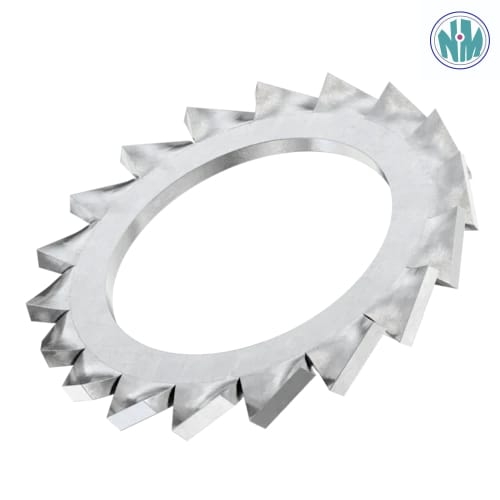
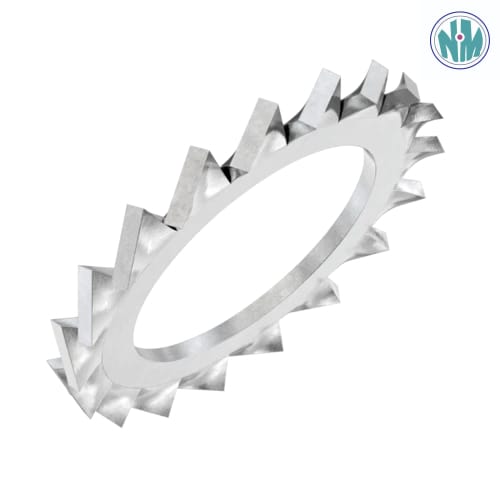
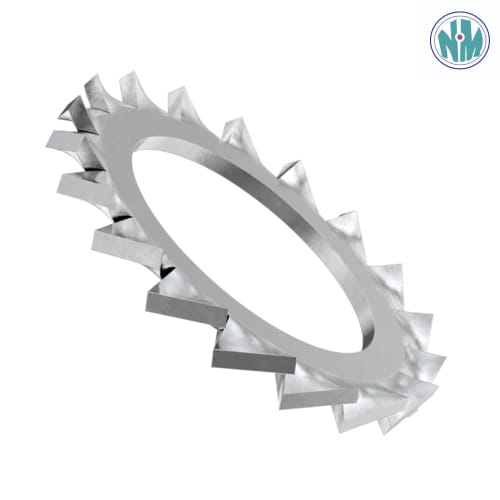
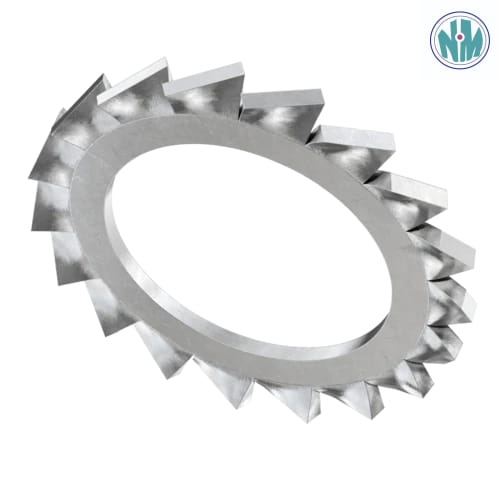
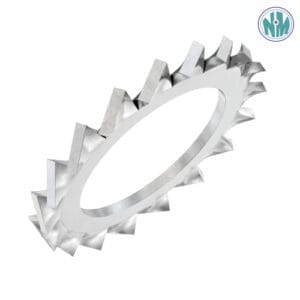
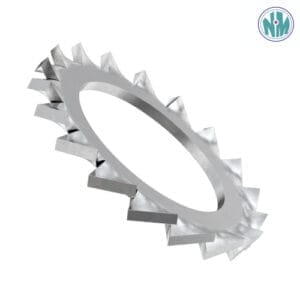
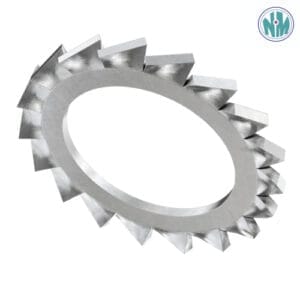

Reviews
There are no reviews yet.